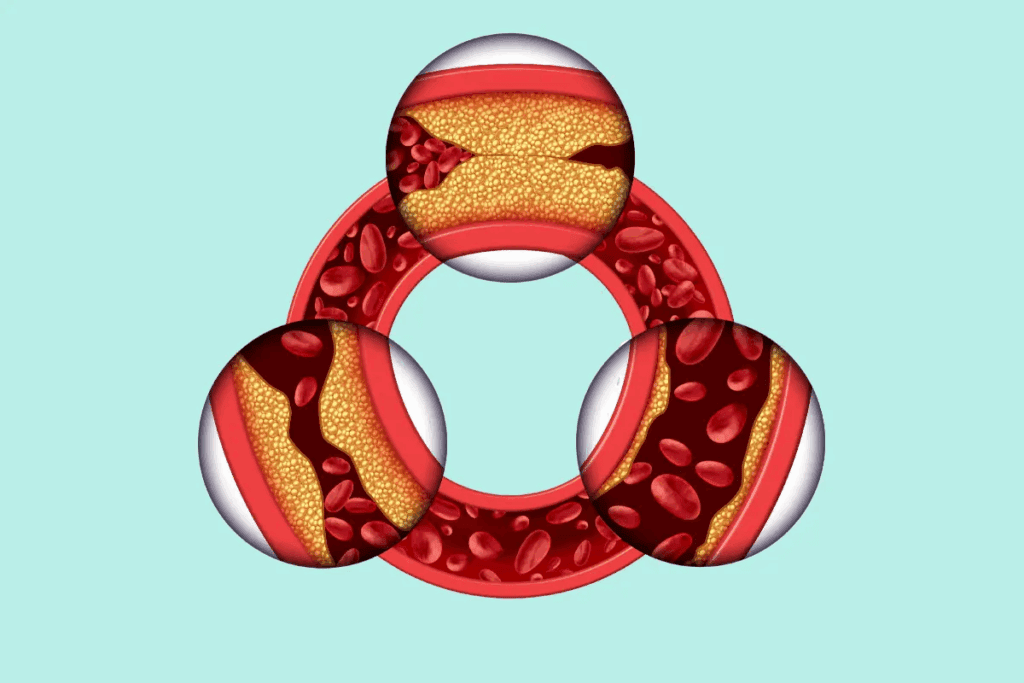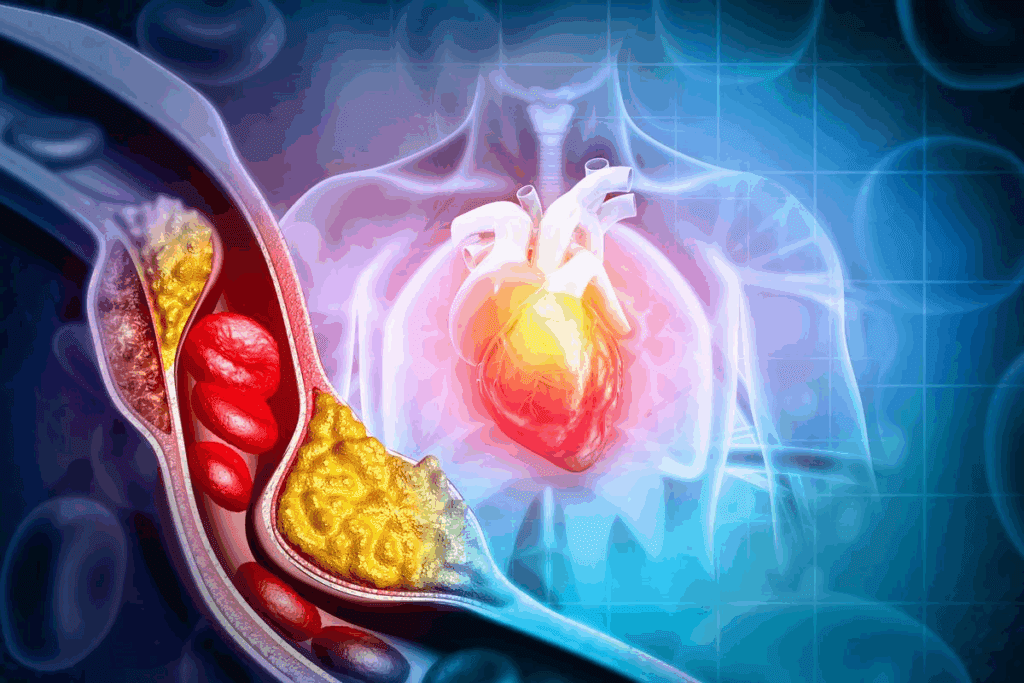Last Updated on November 25, 2025 by Ugurkan Demir

Keeping your arteries clear is key to a healthy heart. Arterial plaque buildup can cause heart disease and stroke. At Liv Hospital, we share the latest ways to remove heart plaque and keep your arteries healthy.Find out what causes plaque to form in arteries and discover natural remedies to reduce buildup and improve heart health.
Living a heart-healthy lifestyle can clear your arteries and boost your heart health. Our guide covers diet, exercise, and lifestyle changes to naturally reduce artery plaque. Follow these steps to improve your cardiovascular health.

Let’s first understand what arterial plaque is and how it impacts our health. Arterial plaque is a mix of cholesterol, fatty substances, and other materials. It builds up on the inner walls of arteries, causing atherosclerosis.
Arterial plaque builds up over time, often without symptoms until it’s severe. The formation of plaque is a gradual process that can start early in life. It progresses silently for decades.
Damage to the endothelial lining of the arteries is a common cause. This damage can be due to high blood pressure, smoking, and high cholesterol levels. Once the endothelium is damaged, cholesterol and other substances can enter the arterial wall, causing inflammation.
This inflammation leads to plaque buildup. Over time, the plaque hardens and narrows the arteries. This restricts blood flow to vital organs.
The dangers of arterial plaque are significant. As plaque builds up, it can cause serious cardiovascular complications. These include heart attacks, strokes, and peripheral artery disease.
When an artery is blocked, blood flow to the heart, brain, and other vital organs is reduced. In severe cases, plaque can rupture. This leads to a blood clot that can block an artery completely. This is a medical emergency that can cause a heart attack or stroke.
Often, the signs of plaque buildup are silent until a serious event occurs. But there are warning signs. These include:
Recognizing these symptoms early and seeking medical attention is key. It can prevent the life-threatening consequences of arterial plaque.

It’s important to know why plaque forms in arteries. This knowledge helps us find ways to lower plaque buildup. Many things can cause plaque, like our lifestyle, genes, and health conditions.
Atherosclerosis is when plaque forms in arteries. It starts with damage to the artery’s inner lining. This damage can be from high blood pressure, smoking, or high cholesterol.
These damages let fatty substances like cholesterol and triglycerides get into the artery. Over time, these substances build up and cause inflammation. The body tries to fix the damage by creating a fibrous plaque.
This plaque grows and can narrow the artery. This narrowing can block blood flow to important organs.
Inflammation is key in atherosclerosis. When the artery is damaged, it gets inflamed. This attracts white blood cells trying to repair it. But, this inflammation can also help the plaque grow.
Chronic inflammation can make the plaque unstable. If it ruptures, it can cause a blood clot. This clot can lead to a heart attack or stroke.
Many things can lead to plaque buildup in arteries. These include:
Knowing these risk factors and how atherosclerosis works helps us prevent plaque buildup. We can take steps to lower our risk.
Reversing arterial plaque is a complex topic in medical research. It’s important to know the latest in medical studies and treatments. This helps us understand how to reverse or stabilize plaque buildup.
Medical experts have learned a lot about how plaque forms and how to reduce it. Research shows that while reversing plaque is hard, lifestyle changes can help stabilize or reduce it. This knowledge comes from clinical trials and studies.
Stabilizing plaque is key because it lowers the risk of heart attacks and strokes. Now, doctors focus on improving overall vascular health, not just lowering cholesterol.
It’s important to know the difference between stabilizing and reducing plaque. Stabilizing means stopping plaque from growing or rupturing, while reducing means making it smaller. Both are important for heart health.
Studies show that some treatments can stabilize plaque, and in some cases, even reduce it. Diet and exercise are key in this process.
New research points to natural ways to reduce plaque. The Mediterranean diet, full of fruits, veggies, and healthy fats, is one example. Also, some nutrients and supplements may help vascular health.
Studies are looking into natural compounds for reducing inflammation and improving arteries. While more research is needed, natural methods seem promising as part of treatment.
To fight arterial plaque, making smart food choices is key. A good diet can lower plaque risk and boost heart health.
The Mediterranean diet is great for the heart. It’s full of fruits, veggies, whole grains, and healthy fats. This diet cuts down heart disease risk. The key components include:
Studies show the Mediterranean diet improves heart health. It can also reduce arterial plaque.
Plant-based foods are packed with nutrients, fiber, and antioxidants. Adding them to your diet offers many health perks. Some top choices are:
These foods are good for your heart and overall health.
Omega-3s are vital for heart health. They fight inflammation and stop plaque buildup. Key sources of omega-3s include:
Eating foods rich in omega-3s keeps arteries healthy. It also lowers heart disease risk.
Some foods are bad for your heart. It’s important to limit or avoid them. Some of the most detrimental foods include:
Avoiding these foods and eating a balanced diet helps. It reduces plaque risk and boosts heart health.
Keeping your arteries healthy starts with the right foods. You need to know about vitamins, minerals, and antioxidants. Eating a balanced diet with these nutrients can help keep your arteries in good shape. It might even lower the risk of plaque buildup.
Antioxidants are key in protecting your heart. They fight oxidative stress, which can harm your arteries. Here are some important antioxidants for your heart:
Some vitamins and minerals are great for your arteries. Here are a few:
| Nutrient | Benefit | Food Sources |
| Vitamin B6 | Helps lower homocysteine levels | Fish, poultry, potatoes |
| Magnesium | Improves blood vessel function | Nuts, seeds, leafy greens |
| Potassium | Helps lower blood pressure | Avocados, bananas, sweet potatoes |
Some natural supplements can also help your arteries. Here are a few:
While these supplements look promising, talk to a doctor before taking them. They might affect your medications or cause side effects.
Combating arterial plaque needs a mix of strategies, with exercise being a big part. Regular workouts boost heart health and help lower plaque in arteries.
Exercise greatly benefits arterial health. It improves blood flow, lowers blood pressure, and helps manage cholesterol. It also boosts nitric oxide, which relaxes blood vessels and improves circulation.
Exercise helps manage weight and reduces inflammation. These are key in stopping plaque buildup. Adding exercise to your daily life can greatly improve your heart health and lower disease risk.
A good exercise plan includes aerobic, strength, and flexibility exercises. Aerobic exercises like walking, cycling, or swimming are great for heart health. Aim for 150 minutes of moderate or 75 minutes of vigorous aerobic activity weekly.
Strength training exercises, like weightlifting, should be done twice a week. They help build muscle, supporting metabolic health and artery function.
Always talk to a healthcare provider before starting a new exercise program, even with no health issues. Start slow and gradually increase workout intensity and duration. This prevents injuries and keeps your routine going.
To keep a fitness routine going, set achievable goals, track your progress, and mix things up. Find activities you enjoy. This makes sticking to your exercise plan easier.
Make exercise a regular part of your life to improve your heart health and overall well-being. Remember, being consistent is key. Even small amounts of exercise can make a big difference if done regularly.
Changing your lifestyle is key to keeping your arteries healthy. We’ve talked about eating right and staying active. But other habits also play a big role in keeping your heart healthy.
Stress can harm your arteries. It’s important to find ways to manage stress every day. Here are some good methods:
These methods can lower stress and blood pressure. As Medical Expert, “The relaxation response is a state of deep rest that counteracts the effects of stress.”
Good sleep is vital for healthy arteries. Bad sleep can lead to inflammation, high blood pressure, and heart disease. To sleep better:
Studies show that 7-9 hours of sleep per night is best for your heart. Prioritizing sleep helps keep your arteries healthy.
Quitting smoking is a big step for your heart health. Smoking damages your arteries and increases plaque buildup. Stopping can greatly lower your heart disease risk.
Also, drinking in moderation is important. While some alcohol may be good for your heart, too much can harm it. We suggest limiting alcohol to no more than one drink per day for women and two drinks per day for men.
High blood pressure and cholesterol are big risks for plaque buildup. Working with your doctor to manage these is key. This might include:
Keeping your blood pressure and cholesterol in check can greatly reduce your risk of heart disease. As the
“American Heart Association emphasizes that controlling high blood pressure and cholesterol is key to preventing heart disease and stroke.”
Keeping an eye on your arterial health and teaming up with healthcare providers are key steps. Regular health check-ups and working with your healthcare team help you track your progress. This way, you can make informed decisions about your care.
Several tests can measure arterial health and spot plaque buildup. These include:
Natural approaches can be effective, but sometimes medical help is needed. You should seek medical attention if you have symptoms like chest pain, shortness of breath. Or if you have a family history of heart disease.
| Symptom | Possible Indication | Recommended Action |
| Chest Pain | Potential heart issue | Seek immediate medical attention |
| Shortness of Breath | Possible cardiovascular issue | Consult your healthcare provider |
| Family History of Heart Disease | Increased risk | Discuss preventive measures with your doctor |
Combining natural methods with conventional medical treatments can offer a complete approach. It’s vital to work with your healthcare provider. This way, you can integrate dietary changes, exercise, and stress management with any prescribed treatments.
“The integration of natural and conventional approaches can lead to better health outcomes for patients with cardiovascular disease.”
Medical Expert, Cardiologist
Many people have successfully reduced arterial plaque through lifestyle changes and medical interventions. For example, a study in the Journal of the American Heart Association found that a Mediterranean diet and regular exercise reduced plaque significantly.
By working closely with healthcare providers and adopting a proactive health approach, individuals can see meaningful plaque reductions. This improves their overall cardiovascular health.
To reduce plaque in arteries naturally, you need a plan that includes diet, exercise, and lifestyle changes. Understanding why plaque builds up is key. Taking action early can greatly improve your artery health.
Begin by looking at your current lifestyle and where you can make changes. Eating a Mediterranean diet full of fruits, veggies, and omega-3s is a good start. Also, regular exercise like walking or cycling is beneficial. Managing stress with meditation or yoga can also help your heart health.
With these tips and your doctor’s help, you can make a plan just for you. This plan will help you control your artery health and lower your risk of heart disease. Start your plan today and move towards a healthier future.
Arterial plaque is a buildup of fatty deposits and cholesterol in arteries. It forms through atherosclerosis. This is when inflammation and damage to artery walls allow plaque to accumulate.
Medical treatments can stabilize or reduce plaque. But, natural methods like diet, exercise, and stress management also help. They can reduce plaque buildup and improve artery health.
Eating a heart-healthy diet is key. Include fruits, vegetables, whole grains, and omega-3 fatty acids. Avoid foods high in saturated fats, trans fats, and sodium.
Exercise improves arterial health by reducing inflammation and improving blood flow. Aerobic exercises like walking, cycling, or swimming are best.
Omega-3 fatty acids, antioxidants, and certain vitamins and minerals may support artery health. Always talk to a healthcare provider before taking supplements.
Stress can worsen arterial health. Techniques like meditation, yoga, or deep breathing can help manage stress. This promotes overall well-being.
Poor sleep can lead to inflammation and harm arterial health. Aim for 7-9 hours of sleep each night. Good sleep hygiene supports cardiovascular wellness.
Yes, quitting smoking is vital for reducing plaque and improving heart health. It lowers blood pressure and improves blood flow, reducing heart disease risk.
Regular health check-ups are key. Tests like CIMT scans or CAC scores help monitor arterial health and track progress.
If you have symptoms like chest pain or shortness of breath, seek medical help. Work with your healthcare provider to find the best treatment.
Yes, natural methods can complement conventional medicine. It’s important to work with your healthcare provider to create a treatment plan that includes both.
StatPearls. (2023). Anatomy, Head and Neck: Carotid Arteries. In StatPearls https://www.ncbi.nlm.nih.gov/books/NBK545238/
Subscribe to our e-newsletter to stay informed about the latest innovations in the world of health and exclusive offers!